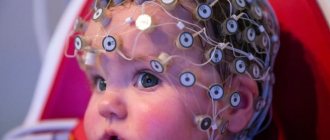Intellectual disorders in children
General information
Intellectual disability in children (mental retardation) is a persistent, irreversible impairment of cognitive activity caused by organic damage to the brain. It is these signs: persistence, irreversibility of the defect and its organic origin that should be primarily taken into account when diagnosing children. The pedagogical criterion for diagnosing children with mental retardation is their low learning ability. Children with intellectual disabilities need care from teachers and parents. The role of adults is to make a child’s life easier in the world, to adapt him to society.
Symptoms of intellectual disabilities
Symptoms of mental retardation include diffuse damage to the cerebral cortex, as well as local lesions that lead to disturbances in mental development. Local lesions cannot be excluded, which lead to a variety of disorders in the development of mental higher cognitive processes, namely:
- perception;
- memory;
- verbal-logical thinking;
- speech.
There may be disturbances in the emotional sphere (increased excitability or excessive inertia). With intellectual impairment in children, physical development may be impaired:
- dysplasia;
- deformation of the shape of the skull;
- limb deformity;
- motor impairment;
- gigantism;
- dwarf stature.
Children with intellectual disabilities
A child with an intellectual disability may be passive in understanding the surrounding reality. According to the degree of mental retardation and the ability for long-term learning, experts distinguish deviations:
- Idiocy. Characterized by a deep degree of retardation and severe coordination disorders. It is difficult to develop self-service skills, and a full understanding of the world around us is inaccessible.
- Imbecility. Characterized by mild intellectual impairment compared to idiocy. Children with this developmental disorder have every chance of mastering speech and mastering some work skills.
- Moronism. The characteristics of children with intellectual disabilities of this form do not allow them to study in regular schools due to the reduced level of mental abilities and the specifics of the emotional-volitional sphere.
The difficulties of teaching and raising such children are associated with the underdevelopment of the analytical and synthetic functions of higher nervous activity. To this should be added rather poor health and somatic disorders. In the future, adults will have a limited range of professional and labor activities. In addition, there is a separate group of children with mental retardation.
A separate group of children includes students who have difficulty mastering the basic school curriculum. But such children cannot be classified as mentally retarded, since they demonstrate sufficient ability to communicate and a wide zone of proximal development. The causes of mental retardation can be different. There are mental and psychophysical infantilism , which is directly related to the harmful effects on the central nervous system during pregnancy.
Adaptation in society
Children with intellectual disabilities, in some cases, study in regular educational schools. But if the disorders are dominated by pronounced cerebrasthenic disorders, they need special educational institutions. In such schools there is a system of special treatment measures for such children and psychological and pedagogical correction. Doctors identify various deviations in the emotional-volitional sphere and cognitive activity of the child. The following factors are common to delayed child development:
- immature emotions;
- lack of intellectual skills;
- low performance;
- poor vocabulary;
- difficulties in verbal and logical operations;
- narrowed view of the world;
- inability to use the game for development;
- slow perception of events;
- low level of self-control.
Teaching children with intellectual disabilities
When teaching children with intellectual disabilities and for their socialization, oligophrenopedagogy methods are used. Children with idiocy are usually not subject to treatment and, with the consent of their parents, can live in special institutions where they are provided with proper care and medical assistance. After reaching adulthood, such children are transferred to orphanages, where they learn to write, read, and can work in special workshops. Difficulties in learning are associated with the fact that such children experience difficulties in understanding the connections between sounds and letters, sets and their numerical expressions, and the inability to establish and understand temporal, spatial and cause-and-effect relationships between objects and phenomena. Intellectual impairment in children in the form of developmental delay usually manifests itself in difficulties in the formation of basic mental operations - synthesis, analysis, comparison and generalization.
In general education schools, children with intellectual disabilities are often subject to ridicule from their peers, which negatively affects their psyche. Therefore, teachers and doctors are inclined to believe that it is more humane to educate such children in specialized institutions. With the right approach, it becomes possible to lay down the necessary knowledge and instill learning skills, which allows them to subsequently transfer them to a regular school.
Teaching children with intellectual disabilities requires an integrated approach , both from doctors and educational psychologists. It is necessary to use all possible resources so that a child with intellectual disabilities can develop his or her existing abilities to the maximum and adapt more easily to adult life.
How to develop the intelligence of a preschool child?
The ideal situation is when you decide to purposefully develop the intellectual abilities of a preschooler, say, at the age of 4-6 years.
And they didn’t just delegate this activity to teachers or tutors, but found time to study together with the child. Before jumping at all the possibilities for preschool development, let's decide on the basic abilities that need to be developed.
Basic intellectual abilities that need to be developed in children
Develop your preschooler’s practical and emotional intelligence, his creative and logical thinking consciously, with an understanding of what needs to be worked on. Children aged five to seven years urgently need training:
- perception
- a cognitive process (it can be simple, complex and special in relation to abstract concepts - time, movement, events); - memory
- the basics, without which further effective development of the intellectual and creative abilities of preschool children is impossible; - attention
: exciting mental activities help in the formation of voluntary attention; The parents’ task is to “switch” the child from involuntary attention during the game to voluntary attention for better perception and assimilation of new information.
Try our games and exercises to train attention and memory.
What kind of intelligence of a preschooler will we develop?
Issues of development of emotional and social intelligence are the subject of a separate article.
We will talk mainly about how to develop mental intelligence (logical-mathematical and spatial) and everyday intelligence (sanity and intelligence).
Intelligence, mental strength
are realized through a number of abilities that it is advisable to develop from early childhood:
- to learn and learn;
- analyze information for its systematization and high-quality assimilation;
- ability to think logically;
- find patterns and differences in the information received, build associations with previously learned facts.
Do you doubt whether you can handle all this on your own? But you are not one of those who will give in to difficulties. Otherwise they wouldn’t read our material.











